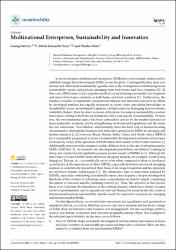Multinational enterprises, sustainability and innovation
Künye
Zamantılı Nayır, D., Lee, Jeoung Y., Chen, C. (2023). Multinational enterprises, sustainability and innovation. Sustainability, 15 (3), 2524.Özet
In recent decades, multinational enterprises (MNEs) have increasingly endeavored to
establish foreign direct investments (FDIs) across the globe. Consequently, they must face
diverse and differential sustainability agendas, due to the homogeneous and heterogeneous
sustainability issues and policies emerging from both home and host countries [1]. In
this vein, MNEs must realize superior methods of establishing sustainable development
and innovation-based solutions in both home and host countries [2]. Furthermore, the
number of studies on sustainable international business and innovative practices by MNEs
in developed markets has rapidly increased in recent years, providing knowledge on
shareholder values, environmental agendas, and processes for managing macroeconomic
instability. Indeed, there has been a stream of literature focusing on sustainability-oriented
innovation, relating to both the environmental and social aspects of sustainability. Of these
two, the environmental aspect has been particularly driven by the market demand for
more sustainable products, and by strengthening environmental regulations and the desire
for cost reductions. Nevertheless, unfortunately, there has been lack of studies focusing
on sustainable international business and innovative practices by MNEs in emerging and
frontier markets [1,2]; however, Brazil, Russia, India, China, and South Africa (BRICS)
have undeniably progressed in terms of sustainable development and innovation-based
solutions, by virtue of the operation of MNEs inside and outside of their home countries [1].
Additionally, innovation has assumed a rather different form in the case of emerging market
MNEs (EMNEs) [3]. As research and development possibilities are limited, learning by
doing and organizational capabilities possess greater weight in EMNEs [4,5]. Although the
innovation of some EMNEs from advanced emerging markets, for example, South Korea,
Singapore, Taiwan, etc., is scientifically savvy, even when compared to those of developed
countries [4,5], the innovation of other EMNEs, especially from less-advanced emerging
markets, is scientifically less refined than those of developed countries and has generally
not involved frontier technologies [6]. The alternative type of innovation pursued by
EMNEs, especially considering sustainability issues, thus requires a deeper investigation;
this looks at the creation of technology more comprehensively than by simply considering
the sphere of research and the patenting activity [6]. Thus, the objective of this Special
Issue is to overcome the limitations of the existing studies, which have mostly focused
on developed markets, and to expand our relevant themes for research into the realm of
international business sustain.

















